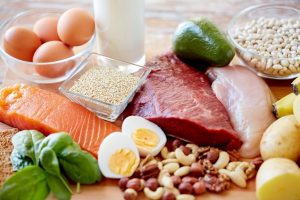 Your temporomandibular joints (TMJ) are located just in front of your ears, connecting your lower jaw to your skull. Inflammation, tension, or injuries to the joints can cause them to function incorrectly. Whether you experience clicking and popping, your jaw locking into an open or closed position, or facial pain, the foods you eat can help or worsen your symptoms. Here are the best and worst foods to eat if you have a TMJ disorder.
Your temporomandibular joints (TMJ) are located just in front of your ears, connecting your lower jaw to your skull. Inflammation, tension, or injuries to the joints can cause them to function incorrectly. Whether you experience clicking and popping, your jaw locking into an open or closed position, or facial pain, the foods you eat can help or worsen your symptoms. Here are the best and worst foods to eat if you have a TMJ disorder.
Best Foods for TMJ Disorders
Maintaining a balanced diet can be difficult if it hurts to chew. Here are a few foods that are easy to chew and will keep you nourished:
Fruits
Choose soft varieties, like bananas, pears, or watermelons to get your daily serving of fruit. You can also eat applesauce and canned fruits, but look for those packed in 100% fruit juice instead of syrup.
Vegetables
Crisp vegetables can support your dental health because they act as scrub brushes for your teeth, but they can be tough to bite and chew. It’s best to cook vegetables, like carrots, asparagus, or squash, to ensure you have enough veggies in your diet.
Protein
Chewy meat can make TMJ symptoms worse. It’s best to skip steak and other tough meat. Instead, choose chicken or fish. You can also get protein from eggs, legumes, and tofu.
Grains and Starches
Soft breads that don’t contain any nuts or seeds are ideal for TMJ sufferers. You can enjoy plenty of soft grains and starches, like pasta, mashed potatoes, muffins, and oatmeal.
Dairy
Low-fat dairy is important for healthy teeth and bones. It’s also easy to chew. Eat plenty of cheese, yogurt, and cottage cheese. If you need a sweet treat, ice cream or pudding can satisfy your craving.
Worst Foods for TMJ Disorders
Your dentist will instruct you to avoid any chewy, crunchy, or tough foods. Skip anything that may cause you to overextend your jaw. Moderate sticky foods, like caramel or gummies.
Besides watching what you eat, take an OTC pain reliever or anti-inflammatory to manage your discomfort. Alternating hot and cold compresses can reduce inflammation and tension. Your dentist can also create a personalized treatment plan to stop your pain and improve your jaw functions, like an oral appliance.
The custom-fit device can train your jaw to rest in a more comfortable position. When combined with lifestyle and diet changes, you can reduce TMJ flare-ups.
About Dr. Pamela West
Dr. West earned her dental degree at the University of Southern California Dental School and has continued her education regularly in various specialties, including neuromuscular and craniofacial pain. She is a proud member of several professional organizations, including the American Dental Association and the Nevada Dental Association. Request an appointment through her website or call (702) 602-4000 to stop your jaw pain.
